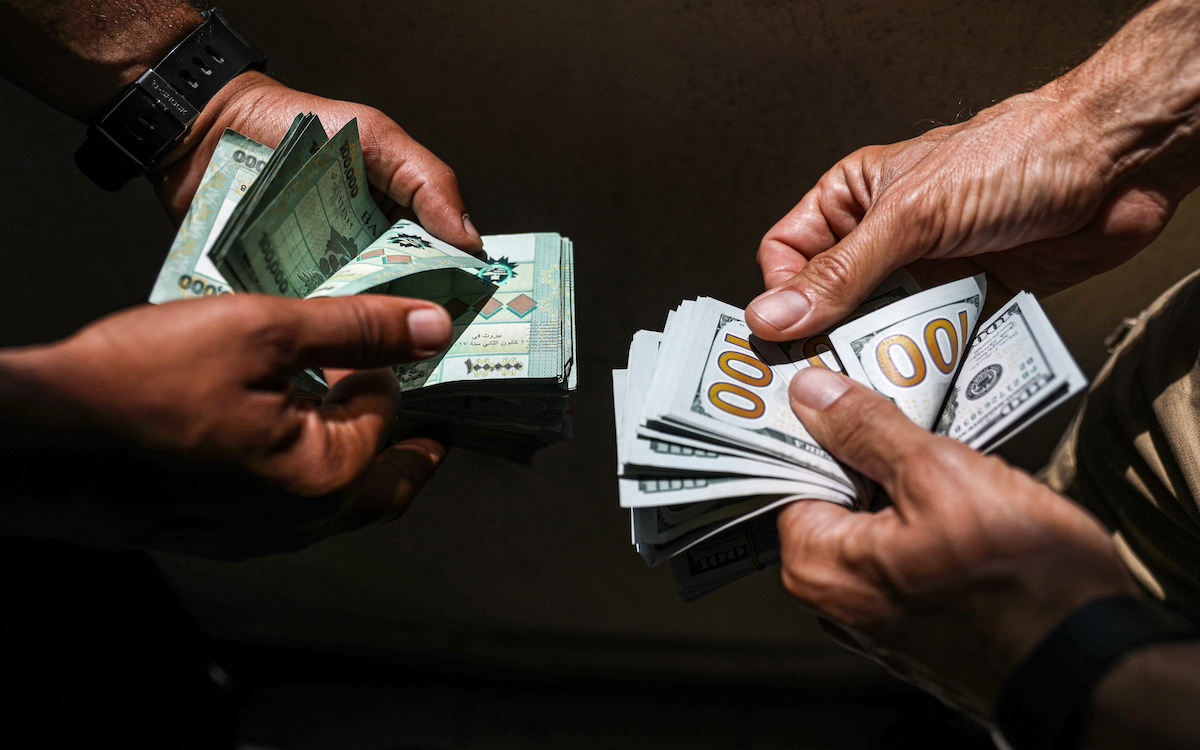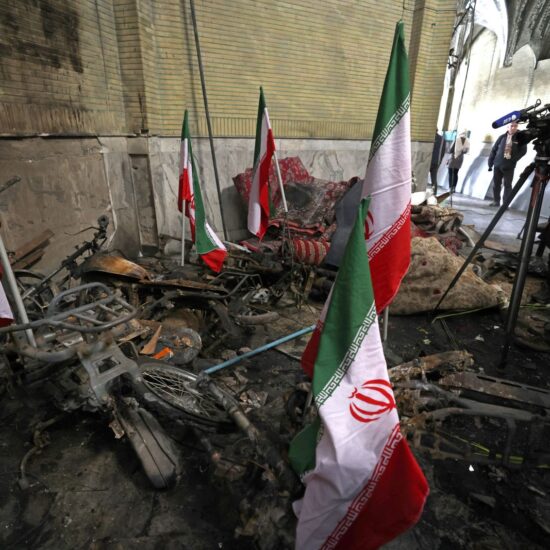
In the days following the May 15 parliamentary election, the Lebanese lira plunged once again.
Although frustrated, nobody was surprised. In the buildup to election day, the lira was already beginning to weaken to the dollar, going from around 24,000 to just over 27,000 by the time ballots were being cast.
By Friday, May 27, less than two weeks after the election, the lira had dropped by 10,000, reaching an all-time low of 37,000 to $1. Fuel prices went up, reaching around 600,000 lira for 20 liters of gasoline.
However, the same day the lira hit record-breaking lows, it also recovered all of the losses made in the days since the election. How? A drop of engineering, of course. Lebanon’s Central Bank started pumping more and more dollars into the market in order to stabilize the exchange rate, which now sits at around 27,000, albeit teetering on the edge of a very deep and dark chasm.
Within one day, some of the smart boys, who understood the opportunity in all this misfortune, made quite a great deal of money: sold dollars in the morning and bought back in the afternoon. The exchange offices in the main square in Chtaura, and probably other places across Lebanon, were full of men waiting in line to buy dollars.
But beyond that, the reality is dramatic. When the lira shot up to 37,000, shops raised their prices. But when the lira regained some value, prices did not decrease much, to the desperation of the Lebanese who are struggling to make ends meet as they are forced to accept payments in lollars at all the commercial banks.
The Central Bank has a limited amount of dollars left and trying to stabilize the market is only depleting these reserves at a more rapid pace.
On the promise of more intervention in the market by central bank, which said it will sell $ to anyone who wants at (discounted) Sayrafa price Monday
It has been doing this since Jan — but with a limited quantity of dollars
Looks like more of Lebanon’s limited $ will be burned https://t.co/SpPzT9Wu7F
— Timour Azhari (@timourazhari) May 27, 2022
What needs to be done is reforms. Reforms that the politicians have been promising since the outset of the crisis but have never actually materialized, instead remaining in parliamentary limbo.
The preliminary agreement with the IMF is a good start for getting cash flowing back into Lebanon, but it will mean nothing unless changes are made.
What happens when the Central Bank can no longer sell dollars?
The lira nearly reached 38,000 to $1 before it intervened.
Next time the Central Bank may not be in a position to do this because its foreign reserves are too depleted, meaning the lira may reach 38,000 once more and then continue to drop to 40,000 or 50,000, or more.
For nearly three years the government has been promising reforms and that they will take action so that Lebanon can begin its journey toward recovery. But nothing happened.
Although an economic recovery plan was adopted by the Mikati government just before the new parliamentary session began, it was flat-out rejected by Lebanon’s banks.
There is a new Parliament now, but it is more divided than ever. This does not inspire much confidence that these next four years will be any different from the last.
The wall around Parliament may have been taken down, but there is still a lot of work that needs to be done, and the country, in dire straits, cannot wait much longer.
A difficult road ahead: On Friday, when the lira hit new lows, Fitch Ratings said that the results of the May 15 election make it difficult for any solid majority coalition to be formed to create a government and, by extension, pass and implement reforms.
Currently, the Parliament is split between several different camps split by their stance on Hezbollah: those with, those against, and the “change” MPs, with none of them holding a clear majority. However, Hezbollah and its allies hold the most seats.
This divide could create a stalemate in which little to nothing is able to get done due to an inability to form agreements.
The first major test for the new parliament is going to be forming a government before President Michel Aoun’s term ends in October and a new president has to be elected.
However, the biggest challenge will be passing the reforms required to receive international aid.
There are many disagreements on what kind of reforms should be implemented. Parliament failed to pass a capital control law, enabling the banks to impose their own, practically arbitrarily locking depositors out from accessing their savings.
Should Parliament be unable to come to any agreements, then the economic crisis is likely to continue the way that it has been for over two years, plunging the country further into collapse.
A possible political crisis
A journey of a thousand meetings: As stated, a huge challenge is going to be forming a new government before Aoun’s term ends in a few months.
While practically everyone in Lebanese politics is calling for a “speedy” government formation, in the past, it has been anything but quick.
Everyone with any amount of influence wants to get their slice and there is often disagreement over who gets which ministry and how many ministries any specific group is entitled to.
Government formation has long been a slow and arduous process that takes many months to reach a final agreement as there can be disagreement over specific names on a list for a proposed government or a party may not be satisfied with the number of ministries that it is receiving, leading them to outright oppose the proposal.
This was evident when former Prime Minister Saad Hariri attempted to form a government after Hassan Diab resigned in the wake of the August 4 Beirut Port explosion.
For months, Hariri and Aoun went back and forth over the makeup of the new government, with both sides claiming that the other was responsible for the deadlock.
After Aoun once again rejected a list proposed by Hariri, the former PM said that he was no longer going to try to form a government, resigning as the PM-designate.
This ultimately led to Najib Mikati being tapped to form a government. Mikati is widely believed to have been chosen to form the post-election cabinet too and he has been working hard to create an image of a centrist politician, although his history in politics places him in the pro-Hezbollah camp.
Samir Geagea’s Lebanese Forces did well in the elections, and are likely to seek more positions in the government. This could lead to conflict between the LF and Hezbollah, after last year’s clashes in Tayounneh.
On top of all this, the newly elected opposition MPs, while not necessarily entitled to a significant role in the government, will push for independent technocrats to be selected for ministerial positions. That is also a request most international institutions have made repeatedly in order to come up with a credible recovery plan.
When Mikati was first selected to form a government in 2021, he was looking to create stability in Lebanon until the elections. But the elections are done and the new cabinet has to get to serious work in order to convince the IMF, the World Bank, and other international donors that the country has a plan to recovery.
Berri eternal: I will not delve too deep into the Parliament’s election of a speaker tomorrow. The current speaker, Nabih Berri, is likely going to be reelected to the position that he has held for 30 years and we spoke about it in last week’s briefing.
Despite parties like the Lebanese Forces claiming that they will not vote for Berri as the speaker, Al-Akhbar reported that Berri has secured more than the 65 votes needed to be elected.
This should come as little surprise as, according to the Taif Agreement which ended the 15-year civil war in Lebanon, the Speaker of Parliament needs to be a Shiite and, since Berri’s Amal Movement and Hezbollah hold all of the Shiite seats in Parliament, there is not really any other option to choose from.
What will be interesting with the vote tomorrow is who votes against Berri’s appointment, as it could be an indication of where coalitions might be headed.
It will also be the first major vote by the opposition candidates who ran against Lebanon’s political establishment.
If they vote against Berri, they will be keeping with the anti-establishment party promises that they made during the election. But if any of them vote in favor of Berri, then it could be a sign that not all of these new MPs who were elected on the idea of change are completely with the movement.
In other news: Drugs, hostage negotiations and Carlos Ghosn.
New Captagon seizure: Lebanon’s caretaker interior minister, Bassam Mawlawi, announced on Sunday that an attempt to smuggle Captagon from Lebanon to the Gulf was thwarted by security forces at the Rafik Hariri National Airport.
A Saudi national was caught with 18.3 kilograms of Captagon in an attempt to bring the drug to Kuwait.
The arrested individual is said to reside in Kuwait and hold Kuwaiti security papers.
Lebanon has been attempting to crack down on drug smuggling since April 2021 when Saudi Arabia banned the importing of Lebanese produce after two million Captagon pills were discovered inside pomegranates that had been shipped from Lebanon.
Despite the crackdown and despite the seizure of large quantities of pills, Lebanon has done little to arrest perpetrators and did not crack down on supply chains. For obvious political reasons.
Free Austin Tice: Major General Abbas Ibrahim, the general director of Lebanon’s general security, has restarted mediations between the US and Syria in an effort to secure the release of journalist Austin Tice who disappeared in Syria a decade ago as well as five others believed to be held in the Syrian regime’s custody.
Ibrahim met with officials in Washington last week to discuss the negotiations.
The Lebanese intelligence chief has previously helped the US in negotiating the release of US citizens in Syrian custody.
In 2019, Ibrahim helped secure the release of Samual Goodwin who had been held in Syria for two months.
However, Syria is unlikely to allow for the release of any prisoners without the promise of something good in return, especially as the regime is under heavy economic sanctions imposed by the US since the start of the civil war 11 years ago.
The Trump administration had attempted to secure Tice’s release near the end of its term in office but failed to do so.
It is unclear if the Biden administration will have better luck. The question is: why is Ibrahim interested in this now, after a decade since Tice’s abduction?
Paradise lost: When former Nissan and Renault executive Carlos Ghosn escaped Japan after facing charges of money laundering, he came to Lebanon believing that he had evaded any charges that might be brought against him abroad.
Lebanon does not extradite its own citizens.
But, Interpol put out a red notice against Ghosn 10 days ago and he could face charges in Lebanon. Imad Kabalan, a public prosecutor at the Court of Cassation, requested that French authorities send over the information that they have on Ghosn, adding that if what they have proves that he had indeed laundered money and misused company assets, then he would be charged in Lebanon.
Ghosn was questioned by a judge earlier today, but no charges were brought against him.
In the region
Flag day: In Jerusalem on Sunday, Israeli nationalists marched through the Old City to celebrate Israel’s annexation of Jerusalem in the 1967 war.
Israel’s prime minister, Neftali Bennett supported the march, but urged participants to behave in a “responsible and respective manner.” The march went, however, as well as most would have assumed it would.
Some participants shouted racist chants at the Palestinians in the Muslim quarter of the city, calling for “death to Arabs.”
Palestinians and Israelis clashed at the entrance to the Damascus Gate with some ultra-nationalist Israelis directly assaulting Palestinians.
Israeli settlers attacked Palestinians with pepper spray and tore up Palestinian flags in the occupied East Jerusalem.
16,000 ultra-nationalists are expected to pass through Jerusalem’s Old City as part of the Flag March, a parade associated with violence against Palestinians pic.twitter.com/CQO1SvbGHW
— Middle East Eye (@MiddleEastEye) May 29, 2022
Some even mocked the death of veteran Al-Jazeera journalist Shireen Abu Akleh who was killed earlier this month by Israeli forces while covering a raid in the Jenin refugee camp in the West Bank.
A CNN investigation found that Abu Akleh was killed deliberately by Israeli forces.
The Associated Press, in their own investigation, said that Abu Akleh was most likely killed by Israeli gunfire but did not say if it was intentional or not.
This Israeli settlers mocks the killing of Palestinian journalist Shireen Abu Akleh by saying ‘no more Shireen’. Last year, Abu Akleh reported on the far-right flag parade from these very steps at Damascus Gate in the Old City in Jerusalam. pic.twitter.com/XS5BKWoXjd
— Arwa Ibrahim (@arwaib) May 29, 2022
Journalists were also assaulted by participants in the march while being told to “go and be with Shireen.”
We witnessed similar in the Muslim quarter. Shortly after, our BBC team were assaulted causing our cameraman to lose part of his equipment. We were later spat at. One shouted: “Go and be with Shireen” https://t.co/dug5Eg8aRT
— Tom Bateman (@tombateman) May 30, 2022
The Israeli security forces dispersed the Palestinians and allowed the march to go on.
Two days prior to the march, a Palestinian teenager, Ziad Ghunaim, was shot in the neck and back by Israeli soldiers in al-Khader, a village near Bethlehem, when he tried to run away from them.
Israeli forces said that they shot in response to Palestinians throwing rocks and Molotov cocktails at them, but, according to the Palestinian state news agency Wafa, witnesses said that Ghunaim just ran away and did not throw anything at the soldiers.
Ghunaim was the fifth teenager killed by Israeli soldiers in the past month.
Deepening ties: Israel and the UAE are set to sign a free trade deal tomorrow as the two countries look to boost their economic ties.
This agreement will see customs payment reduced on products such as food, agriculture, cosmetics, medical supplies and medicine.
A closing humanitarian corridor: Russia could vote in July to close the last remaining humanitarian corridor in Syria used by international organizations to deliver aid to Syrians displaced during the country’s civil war.
The Bab al-Hawa crossing in Idlib on the Syrian-Turkish corridor is the last avenue that humanitarian organizations have to deliver aid to the Syrians who are in desperate need of it, but Russia has voiced opposition to keeping it open, arguing that the aid should only be delivered with the approval of Bashar al-Assad’s government.
While three other corridors were closed, Bab al-Hawa was allowed to remain open after intense negotiations with the Russians, who have the ability to veto in the United Nations Security Council.
Russia could be persuaded to once again keep Bab al-Hawa open, but this would likely come at the concession of the tough actions taken against the country for its invasion of Ukraine on February 24.
Should the door be closed, it has the potential of creating yet another refugee crisis in Europe and the Middle East.
Lebanon+
Podcasts: There is only one podcast episode this week with Medea Azouri and Mouin Jaber hosting John Achkar on Sarde after dinner. The three discuss what it was like for Achkar growing up as a Christian in Lebanon, which is deeply sectarian, and what it was like being part of the Lebanese Forces, marriage and divorce in Lebanon’s religious courts, his comedic inspiration and the newly elected opposition MPs.
Until next week, follow NOW Lebanon on Twitter, Instagram, Facebook, and LinkedIn, and subscribe to our weekly newsletter. And stay safe.








